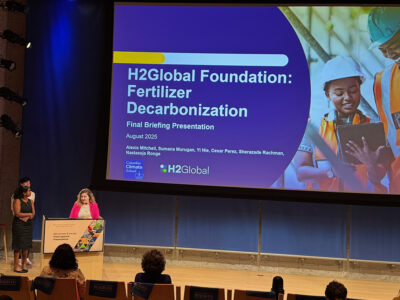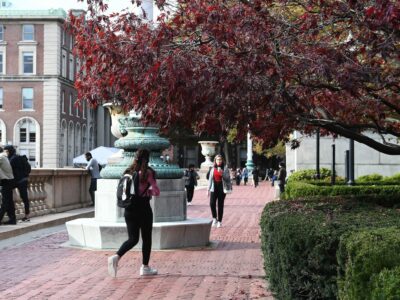
Columbia College Junior Hannah Perls was interning for Congressman Edward Markey, co-author of the historic Waxman-Markey climate bill, when she first considered a future working on Capitol Hill in environmental policy and energy issues. This summer, as part of her studies in the undergraduate special concentration in sustainable development, she completed a seminar on sustainability in Tokyo, Japan, where she explored the potential for future second generation biofuel use and implementation in the global energy market.
The seminar strengthened Hannah’s desire to tackle development issues from an environmental science focus. “The seminar allowed me to explore energy and resource scarcity issues from a variety of perspectives: political, social, economical, environmental,” says Hannah. “It really challenged the way I define sustainable development.”
Hannah was one of four Columbia students in the undergraduate special concentration in sustainable development who spent three weeks this summer at Tokyo’s Waseda University, with close to 30 students from all over the world, to study sustainable development issues with respect to water, agriculture and urbanization. The Global Seminar on Sustainability, co-organized by Columbia professor Kevin Griffin, who heads up the sustainable development concentration, brought together faculty and students from Harvard, Columbia, Peking University, the National University of Singapore, the University of Washington, Waseda University and Yale to study issues of enduring and emerging global concern.
The sustainable development concentration at Columbia has grown significantly since it launched in the fall of 2007—so much so that the University is in the process of developing a full major, with plans for it to be in place in 2010.
Sustainable development education at Columbia could not have grown as much as it has without the support of donors like Joe and Barbara Ellis. When Joe and Barbara were undergraduates at Columbia College and Barnard in the 60s, there were few opportunities to take courses in environmental science. “Columbia quickly became a leader in the environmental field … and succeeded in establishing a special concentration in sustainable development at Columbia College,” say Joe and Barbara.
The summer seminar in Japan provided students with an intensive, multidisciplinary study of the idea and implications of sustainability, and it focused on investigating the issue of sustainability through past and present case studies. Using the Aswan Dam development in Egypt as their case study, the students looked at how the establishment of partnerships between private entities, the United Nations, and the governments of developed and developing nations must be created for global sustainability and diversification of energy sources. It also provided Hannah and fellow students David Raisler, Semee Yoon and Joseph Raser with the opportunity to see firsthand how undergraduate students from countries such as Singapore, Japan and China are learning about and dealing with issues of sustainable development in their own countries.
Senior David Raisler, a history major who has worked with Michael Gerrard, director of the Center for Climate Change Law, collaborated with fellow student Semee Yoon to examine the use of desalination methods and how they negatively impact surrounding ecosystems. He appreciated being in the seminar because it brought together participants from all over the world and provided a more diverse perspective, particularly on the issue of development.
David found that there was a strong emphasis, by the faculty and the students, on thinking of people on the ground and how global problems like a rapidly changing climate affect them. “Climate change is the pivotal issue for my generation. I want to work toward ensuring we do not destroy humanity’s basis for survival—the planet.”




It’s great to know that there is a growing demand for courses in sustainable development.